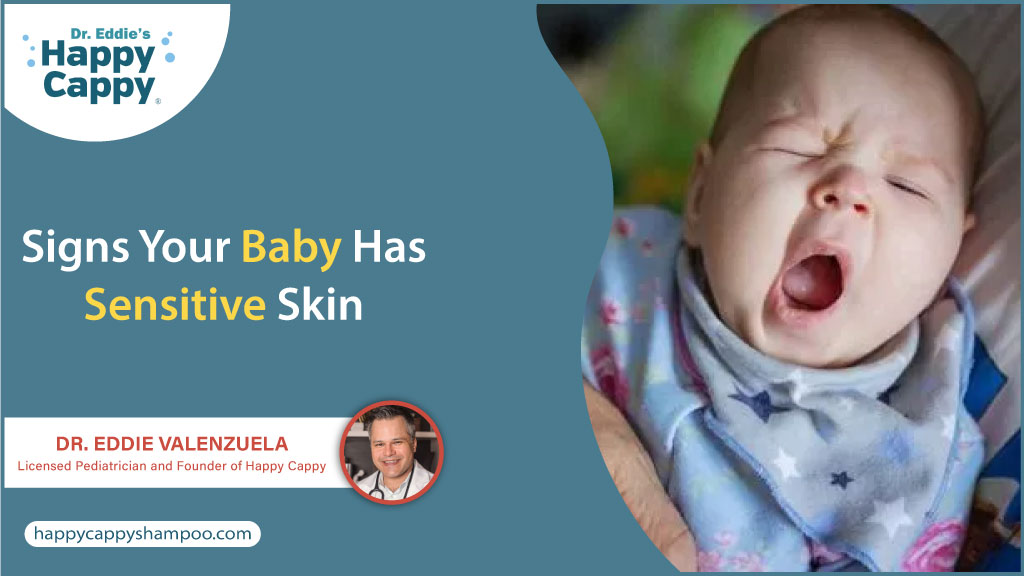
There’s a reason why the term “baby soft skin” is used so often. Babies really do have soft, lovely skin. But their skin is also delicate. Skin isn’t able to retain a proper moisture level and doesn’t fully mature until around the age of two, making all babies have somewhat sensitive skin.
What is Sensitive Skin in Babies?
Some babies have much more sensitive skin than others, leaving them more vulnerable to daily stressors. This hypersensitive skin type has a more severe reaction to environmental exposures that are better tolerated by average skin.
If your baby’s skin is sensitive they will experience the following symptoms more often:
- Red rashes
- Itching
- Dryness
- Skin tightness
- Flaky skin
Does Your Baby Have Sensitive Skin?
A few signs that may indicate that your baby has sensitive skin are:
1. Dry Skin
Dry skin is one of the most common signs of sensitive skin in babies and adults alike. When the skin loses its moisture it becomes more sensitive and vulnerable to outside irritants and allergens.
Newborn dry skin is very common, sometimes it may be a sign of sensitive skin and other common skin conditions in babies. To prevent dry skin avoid using heavily scented creams and moisturizers and stick with products that won’t cause further irritation.
2. Redness
Dryness and redness often show up together when a baby has sensitive skin. Redness can show up anywhere on the body, but it often appears around babies’ mouths from drooling. Friction from clothing, temperature changes, wind, and heat can all cause redness on sensitive young skin.
3. Diaper Rash
Bumpy, red, and irritated patches can show up anywhere on babies with sensitive skin, but these rashes most commonly appear in the diaper areas, leading to the name “diaper rash.” Dampness from a dirty diaper can further irritate skin, so be sure to change your baby as soon as you can.
A damp moist environment in the diaper area can become a flourishing ground for yeast naturally present on the skin–Malassezia yeast. Overproduction of this yeast can lead to cradle cap in babies.
4. Baby Acne
Baby acne or neonatal acne is very common in babies. Most babies experience it in the first few weeks of their life. It causes small red bumps that greatly resemble pimples to appear on their foreheads, noses, and cheeks.
Baby acne can also be a sign of sensitive skin. It usually clears up on its own within a few weeks or months however, in severe cases, it may need to be looked at by a doctor.
5. Heat Rash
If your baby has sensitive skin, their skin will be easily irritated by sunlight and heat. They will experience heat rash also known as ‘Miliaria’ more often than a normal skin would. It can cause redness, irritation, and rashes on the skin.
To prevent heat rash try keeping your baby cool and avoid making them wear tight clothes as sweating can make the condition worse.
6. Eczema
Eczema is a major sign of sensitive skin. The condition leads to a red, raised, weepy, and often painful-looking rash on the cheeks, forehead, elbows, and knees. Eczema or also known as atopic dermatitis can be further irritated by dry skin, irritants, and sweat.
7. Contact Dermatitis
Contact dermatitis is a type of eczema. In simpler words when the skin becomes irritated or allergic after coming in contact with a certain irritant or allergen it is known as contact dermatitis.
If your baby’s skin becomes red and irritated by the use of a certain baby lotion then they may have sensitive skin. Some of the most common triggers are nickel, pollen, chemicals in baby products, and dust mites. To learn more about contact dermatitis and its causes read this blog.
What Causes Sensitive Skin in Babies
Various triggers cause sensitive skin in babies. The baby’s skin was covered in amniotic fluid during pregnancy. This makes it difficult for their skin to adjust to the new environment as it is still developing. Even some of the most common things can trigger reactions on their skin like:
- Heat
- Sweat
- Friction
- Air pollution
- Chemicals in baby products
- Hard water
- Cold, dry wind
- Laundry detergents
- Saliva
- Genetics
- Skin conditions (eczema, baby acne, and skin allergies)
Caring for Baby’s Sensitive Skin
Luckily, many babies grow out of their sensitive skin. But until they do, it’s important to manage the symptoms while avoiding the underlying triggers and causes. Here is a list of a few things you must do to care for your baby’s skin.
Bathtime Care
- Bath your baby in lukewarm warm and avoid using hot water
- Sponge bath them for the first few weeks of their life.
- Bath them 2 to 3 times a week.
- Keep the bathtime short around 10 minutes maximum.
- Make sure to use a body wash instead of soap that is free from harsh chemicals and fragrances.
- If you are bathing your baby daily use a gentle daily baby shampoo and body wash.
- After bathing pat dry their skin instead of rubbing it.
Keep it Moisturized
- Keep their skin moisturized at all times. Moisturize their skin at least twice daily.
- Moisturize your baby’s skin after bathing them while their skin is still a little damp.
- Use a moisturizer or baby lotion that is hypoallergenic, free from fragrances, and is specially formulated for dry, sensitive skin.
Protection From Sun
- Try avoiding going out in direct sunlight.
- If necessary then cover the baby’s body as much as possible to prevent direct contact with UV rays.
- If your baby is 6 months old then use sunscreen while going out.
- Don’t spend too much time in sunlight and heat to prevent heat rash.
Diaper Care
- Change their diaper every few hours.
- Immediately change their diaper after it’s soiled.
- Avoid using diapers with fragrances and hard materials.
- Keep the diaper area clean and dry.
- Wash the diaper area instead of using a wet wipe to prevent contact dermatitis.
Right Clothing
- Avoid using clothes with irritating fabrics like synthetic and wool.
- Cloth your baby in loose-fitting clothes with breathable fabric.
- Pre-wash their new clothes before using them.
- Use a gentle fragrance-free detergent to wash their clothes.
Laundry
- Try using a laundry detergent that is made without any dyes or fragrances as these ingredients can be too harsh on sensitive skin. Dryer sheets can also be a menace. Stop using them or investigate the fragrance-free variety.
How to Soothe Sensitive Skin
The best way to soothe sensitive skin is by
- Avoiding the triggers
- Keeping it clean and moisturized
It is vital to use soaps, shampoos, and creams that are specifically made for babies with sensitive skin. Look for a baby eczema shampoo like Dr. Eddie’s Happy Cappy Daily Shampoo and Body Wash.
Formulated by a licensed pediatrician, Happy Cappy Daily Shampoo and Body Wash is free of skin irritants such as fragrance, dye, alcohol, sulfates, and phthalates. It is 95% plant-based and features ingredients like licorice root extract, oatmeal, aloe, hyaluronic acid, and provitamin B5 to moisturize hair and skin. Use Happy Cappy Daily Shampoo and Body Wash as an eczema shampoo for babies or as a daily solution for soothing sensitive young skin.
FAQs
Is it normal if my baby has sensitive skin?
Baby’s skin is known to be delicate, fragile, and soft. This is because the baby’s skin is not fully developed, which makes it more sensitive. So sensitive skin is very typical in babies. Properly caring for your baby’s skin is essential to avoid skin problems.
How can I identify my baby’s skin type?
If your baby’s skin gets rashes often and reacts to extreme temperature and harsh chemicals in the products, then there is a chance your baby may have susceptible skin.
What is the best way to soothe a baby’s sensitive skin?
The best way to soothe a baby’s skin is by keeping it moisturized. Choosing a moisturizer with no harsh chemicals that is fragrance-free, sulfate-free, and paraben-free is essential. Happy Cappy Moisturizing Cream is specially formulated for baby’s sensitive skin. It keeps the baby’s skin healthy by locking moisture in the skin.
Why does my baby’s skin turn red when touched?
There are a few things that may be causing your baby’s skin to turn red. One of the most common causes is that your baby’s skin may be very sensitive. Just like the phrase says, “sensitive to touch.” Another reason may be that your baby is experiencing eczema, which makes their skin dry.
When will my baby’s skin develop fully?
Babies have sensitive skin because their skin is still developing. The skin fully develops around the age of 2, and around this time your baby’s skin will no longer be as sensitive. But for some kids, their skin may stay sensitive throughout their life.
